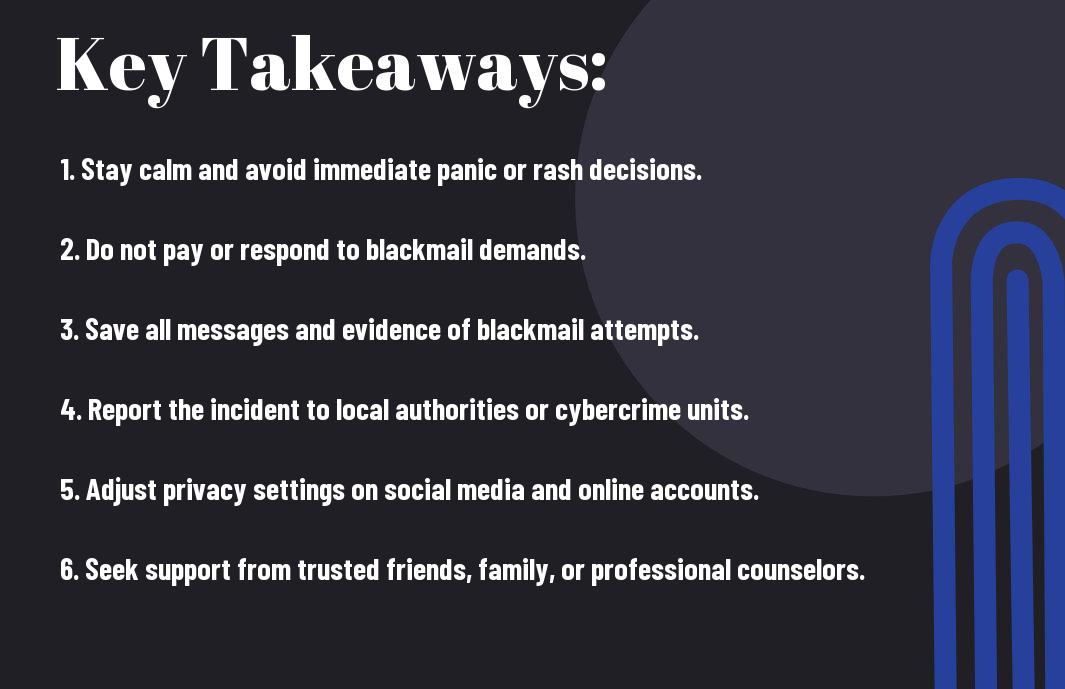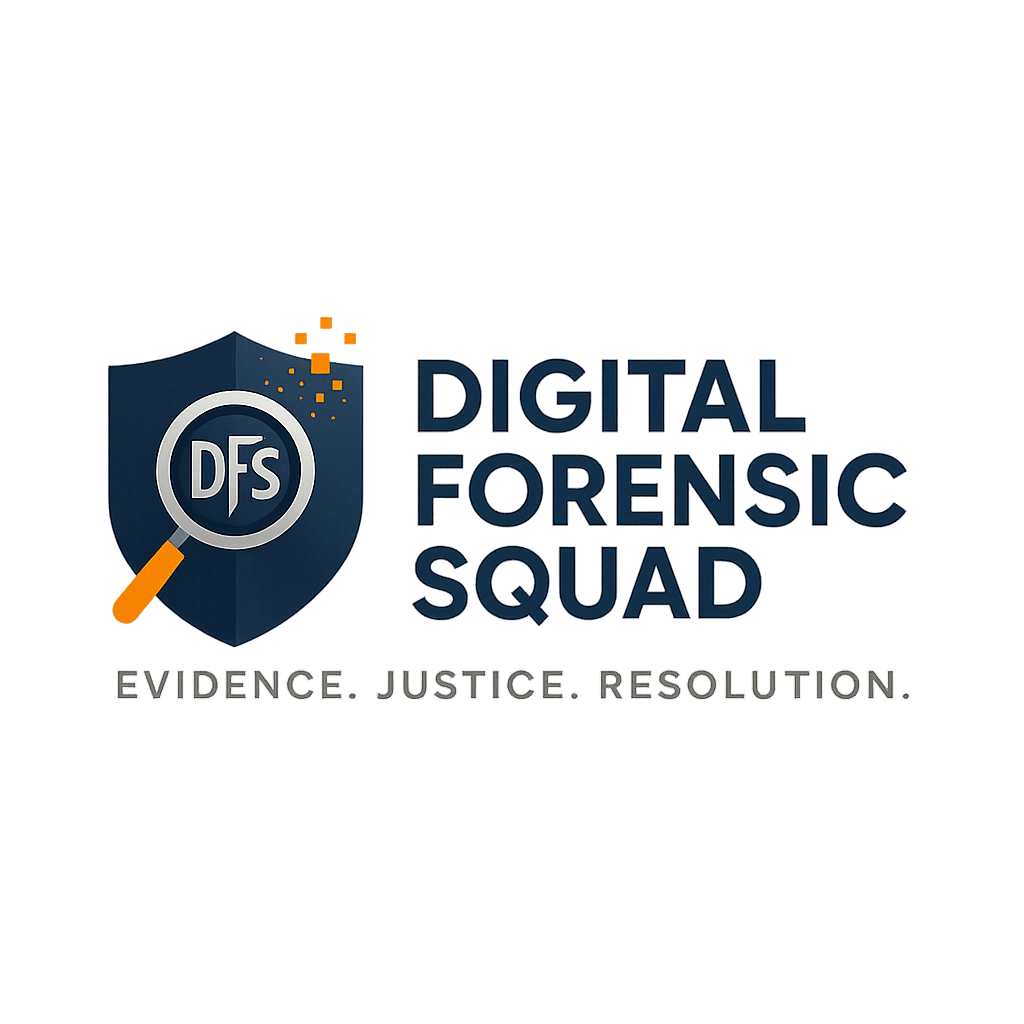Blackmail is a serious threat that can leave you feeling vulnerable and trapped. When you’re being blackmailed online, it’s important to recognize that your safety and privacy are at risk. Understanding how to respond effectively can protect you from further harm and help you regain control. This guide will provide you with clear steps to identify, document, and report the blackmail, ensuring you know that help and support are available to navigate this difficult situation. So when you are stuck thinking “I’m being blackmailed online” you should immediately contact Digital Forensic Squad for assistance.

Key Takeaways:
- If you’re being blackmailed online, avoid responding to the blackmailer or meeting their demands immediately to prevent further risk.
- Document all communications and evidence of the blackmail, then report the incident to local law enforcement and relevant online platforms.
- Seek support from trusted friends, family, or professional counseling to manage the emotional impact and explore legal options.
Understanding Online Blackmail
Before you can effectively protect yourself from online blackmail, it is vital to understand what it entails and how blackmailers operate. Gaining this knowledge enables you to recognize threats early and respond appropriately. By familiarizing yourself with common methods and definitions, you empower yourself to take control of the situation and reduce your vulnerability in the digital space.
Definition of Online Blackmail
Online blackmail occurs when someone threatens to reveal your personal, sensitive, or embarrassing information unless you meet their demands, often involving money or other favors. This malicious act targets your vulnerabilities to manipulate you through fear and coercion, leveraging the anonymity and reach of the internet to pressure you into compliance.
Common Tactics Used by Blackmailers
Across various situations, blackmailers employ tactics such as threatening to expose private photos, fabricated accusations, or hacked conversations to intimidate you. They may impersonate someone you trust or use fake profiles to gain your confidence, increasing their leverage and making it harder for you to seek help without fearing damage to your reputation.
Plus, blackmailers often escalate their threats quickly, demanding payment via untraceable cryptocurrencies or insisting on continued secrecy to keep you isolated. These methods increase the danger, as you might feel trapped without clear options. However, understanding these tactics helps you spot dishonesty and manipulative behavior early, enabling you to act decisively and seek support before the situation worsens.

Recognizing the Signs of Blackmail
Even if you’re uncertain, recognizing blackmail online depends on identifying manipulative behaviors aimed at controlling you through threats. You might receive demands for money, explicit content, or silence, paired with threats to expose sensitive information. Your instinct should alert you to sudden pressure and attempts to isolate you. Understanding these signals empowers you to take action before harm escalates.
Warning Signs to Look For
Below are key warning signs: unexpected messages threatening to reveal your private data, urgent demands for money or favors, and attempts to emotionally manipulate you by exploiting your fears. If you notice persistent contact from someone who uses intimidation to make you comply, this behavior often constitutes blackmail. Trust your feelings if something seems off, and protect your digital privacy.
Personal Stories and Experiences
Between accounts shared by victims, you’ll find common patterns of fear and confusion when faced with blackmail. People often describe feeling trapped, unsure of whom to trust or how to respond. Their stories highlight the importance of reaching out for help and not dealing with the threats alone. Learning from others’ experiences can empower you to act decisively and safely.
Stories reveal how victims have overcome blackmail by seeking support from trusted friends, authorities, or professional counselors. Many emphasize the relief of speaking out and breaking free from isolation. Hearing these narratives shows you are not alone and that taking action can lead to positive outcomes, helping you regain control over your life.
Immediate Steps to Take
Many individuals who face online blackmail find themselves unsure of what action to take first. You should immediately stop all communication with the blackmailer to avoid further manipulation. Secure your online accounts by changing passwords and enabling two-factor authentication. Consider informing trusted friends or family members so you’re not isolated during this stressful time. Most importantly, report the incident to the appropriate authorities and online platforms to initiate formal protections. Taking these steps promptly can help you regain control and mitigate potential harm.
Don’t Panic: Staying Calm
Behind every threatening message lies an opportunity for you to take control, and maintaining composure is vital. Panicking can lead to impulsive decisions that may worsen the situation, such as accidental leaks or hasty responses. Instead, focus on clear, methodical actions to protect yourself and your personal information. Staying calm allows you to think critically and make informed choices, which will empower you to face the online blackmail situation effectively.
Documenting Evidence
Panic may tempt you to delete messages or hide evidence, but this can severely reduce your ability to seek help. You should carefully save all communications, including screenshots, emails, chat logs, and timestamps. This evidence is often a key factor for law enforcement investigations and legal proceedings, so maintaining a detailed record is in your best interest. Additionally, avoid altering or tampering with the material to preserve its integrity.
Hence, maintaining comprehensive documentation not only protects you legally but also provides a clear timeline of events, which can illustrate the gravity and persistence of the blackmail attempt. Store the evidence securely in multiple locations—both digital and physical if possible—and consider using encrypted storage solutions. By doing this, you ensure that your documented proof is accessible and credible when you engage authorities or seek professional advice.
Reporting the Incident
Once again, taking prompt action is imperative when you’re being blackmailed online. Reporting the incident can help you regain control and protect yourself from further harm. By notifying the appropriate authorities and online platforms, you increase the chances of stopping the perpetrator and preventing others from becoming victims. Keep detailed records of all communication and evidence, as this will support your report and any investigations that follow.
Contacting Authorities
Beside seeking help from online platforms, you should also contact your local law enforcement or cybercrime units. Law enforcement agencies are equipped to handle such sensitive cases and can provide you with guidance tailored to your situation. Reporting to authorities ensures that the blackmailer’s actions are officially documented and may lead to criminal charges, offering you a layer of protection and legal support throughout the process.
Reporting to Online Platforms
Before continuing to interact with the blackmailer, report their behavior directly to the online platform where the abuse is taking place. Most platforms have established protocols for handling harassment and blackmail, which can result in suspension or removal of the offender’s account. This step helps to halt the blackmail on that platform and alerts administrators to potentially harmful users affecting other individuals.
This process of reporting to online platforms empowers you by taking back control and limits the blackmailer’s reach. Online services often have dedicated teams to investigate such reports swiftly and take decisive action to protect users like you. By submitting detailed evidence and following the platform’s reporting guidelines, you increase the likelihood of a favorable outcome while contributing to a safer digital community. Your proactive reporting can prevent further harassment and signal to the perpetrator that their actions will not go unchecked.
Protecting Yourself from Future Threats
All incidents of online blackmail highlight the importance of adopting proactive measures to safeguard your digital identity. You need to stay vigilant and implement strong security practices, continuously update your knowledge on potential threats, and ensure you take steps to reduce vulnerabilities. By fostering a mindset focused on protection and education, you empower yourself to respond effectively and minimize the risk of being targeted again.
Enhancing Online Security
Between using complex, unique passwords and enabling two-factor authentication on all your accounts, you can significantly strengthen your online security. Regularly update your devices and software to patch vulnerabilities and avoid clicking suspicious links or downloading attachments from unknown sources. These habits create multiple layers of defense that make it harder for attackers to compromise your information.
Educating Yourself on Online Safety
Online safety education equips you with knowledge about the latest scams, tactics used by cybercriminals, and ways to spot potential threats early. Understanding these factors helps you navigate the cyberspace more confidently and avoid falling victim to manipulative schemes.
For instance, by learning about common social engineering techniques, you become better at recognizing when someone is trying to deceive or manipulate you. This education also includes staying informed about privacy settings on social media and how to utilize encryption tools, which significantly reduce your exposure. Taking time to study real-world cases of online blackmail exposes you to the potential dangers and enables you to take positive, protective actions tailored specifically for your online behavior.
Seeking Support
Unlike facing this challenge alone, reaching out for help can significantly lessen the burden and give you a clearer path forward. Support is available in many forms, from professional advice to community connections, each offering a vital resource to empower you and protect your well-being.
Legal Advice and Counseling
One of the most effective steps you can take is to seek legal advice from a qualified professional who understands online blackmail. They can help you understand your rights, know the appropriate actions to take, and guide you through protecting yourself legally and emotionally.
Support Groups and Resources
Counseling services and support groups offer a safe space where you can share your experiences without judgment. Connecting with others who have faced similar threats can provide emotional relief and practical advice, helping you regain control and confidence.
Also, numerous organizations provide confidential support and educational resources designed to help you navigate the complexities of online blackmail. These groups often offer 24/7 helplines, online forums, and recovery programs tailored to your needs, ensuring you’re not isolated and have access to ongoing assistance.
Conclusion
Presently, if you find yourself being blackmailed online, it is important to take immediate steps to protect your safety and privacy. You should avoid engaging with the blackmailer and report the incident to the appropriate authorities. Seeking support from trusted individuals or professionals can also help you navigate the situation effectively.
FAQ
Q: What steps should I take immediately if I am being blackmailed online?
A: If you find yourself being blackmailed online, it is important to stay calm and avoid responding to threats with panic. Do not give in to the demands or send any money or personal information. Instead, save all communications and evidence, such as messages, emails, and screenshots. Report the incident to the platform where the blackmail is happening, and contact your local law enforcement agency for assistance. Additionally, inform trusted friends or family members so you have support during this time.
Q: How can I protect my online accounts and personal information from being exploited for blackmail?
A: Protecting your online accounts involves using strong, unique passwords for each platform and enabling two-factor authentication whenever possible. Avoid sharing sensitive personal information or private photos online, especially on public or unsecured platforms. Be cautious about accepting friend requests or messages from unknown people, and adjust your privacy settings to limit who can view your profile and posts. Regularly review your account activity to detect any unauthorized access early.
Resources:
- Sextortion resources provided by law enforcement.


